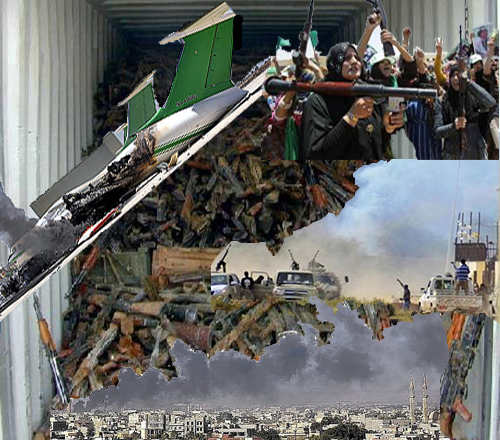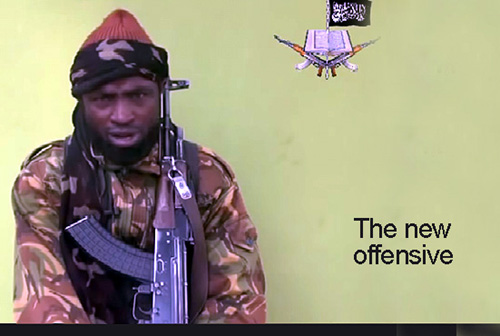 The cocks have come to roost in Libya: yet another example of why instant democracy is a bad idea.
The cocks have come to roost in Libya: yet another example of why instant democracy is a bad idea.
With all the rest of the troubles going on in the world Libya is being neglected if not ignored, and yet the fighting this week in Tripoli rivals almost anything that’s happening right now in Gaza, the Ukraine or Iraq.
The Tripoli airport is in shambles. The tower is down. About 20 commercial jetliners sit idle at wrecked gates or scattered among the tarmac.
“Foreign diplomats, workers flee Libyan chaos by thousands,” the Los Angeles Times reported this morning.
The Philippines is among the dozens of countries evacuating its nationals. This will mean that Libya’s hospitals will collapse.
Thousands of Libyans themselves are also fleeing. Tunisian soldiers killed two trying to stop the crowds surging across the border.
The Washington Post tried to sort out the combatants yesterday and decided that militants, previously from the city of Misrata, are coming out on top. They’ve almost taken over the Tripoli airport.
And it’s not the national Libyan army that’s stopping them. The army has disbanded and many of its highly skilled soldiers – trained by the U.S. and allies – have fled to their respective militias… with their modern weapons. Also supplied by the U.S. and its allies.
The Misratas haven’t taken over the Tripoli airport because several other militant groups led by the Zintanis are in the passenger terminal shooting back.
At the height of the Libyan revolution, Zintanis and Misrata militias fought side-by-side.
And in Benghazi, where the Libyan revolution began three years ago, guess who’s now in control? A former Gaddafi general.
“Towns fight towns; Islamists oppose nationalists; federalists rise up against central government; ex-Gaddafi units clash with former revolutionaries – and everyone has guns, artillery, tanks and missiles, taken from the vast arsenals the deposed dictator had stashed across the country,” Reuters reported yesterday.
After the fall of Gaddafi, western powers led by the U.K., France and Britain stepped in to quickly create democratic institutions. A democratically elected government, fully in place two years ago, was deemed freely and fairly constructed by outside western observers.
The problem is that each individual faction thinks that democracy will immediately get them what they want. The Zintanis, coming from remote Berber mountain villages, felt Gaddafi stole their oil and gave them nothing in return.
The Misratas, more developed and mercantile, fear any kind of religious law and believe their taxes are too high.
Neither grievance has been addressed by the weak existing government, in large part because it has never been able to enforce anything. Too many people have too many weapons.
“Hampered by hypocritical ‘no boots on the grounds’ orders, Western military advisers could do little as Gaddafi’s vast arms stocks were pillaged by all comers,” explains London’s Telegraph’s Mideast correspondent.
Stepping beyond journalism, Richard Spencer then reminded British readers that “I … tried to alert the authorities… to the presence of 100,000 landmines, boxes of Semtex, anti-tank and anti-aircraft missiles lying unguarded in a field and adjacent warehouses in south Tripoli. Nothing was done, and within days they had been pilfered.”
As a columnist for Gulf News Spencer was more explicit:
“The same powers [that topped Gaddafi] seem to have turned a blind eye to a nation whose current sorry state is partly a result of their own faulty policies.”
Which faulty policies? Any of a million that contribute to the toppling of an authoritarian regime replaced by democracy.
I admire the New York Times this morning for warning western countries against abandoning Libya, but the Times analysis is simplistic. This isn’t just a battle between Islamists and non-Islamists: it’s much more complicated than that.
You can’t turn democracy on like a light bulb above the sink. It takes years, often generations to evolve. It’s both the reason that Russia is sliding back into authoritarianism and China is inching towards real democracy. Both of these dramas will likely continue long after I’m gone.
It was the height of absurdity to think that the arsenal of destruction Gaddafi had amassed could be managed by a fledgling democracy. That was the first mistake.
Democracy often works badly. Take our own current state of affairs, although we’ve dealt with ups and downs for so many years I’m hopeful we’ll finally creep out of the irresponsible governing abyss we now found ourselves.
But we demonstrate a certain immaturity if we think that the “help” we gave the Arab Spring revolutionaries would result in anything other than the bloodshed currently playing out. That was the second mistake.
You can’t liberate the oppressed with democracy. It never fills a void. It must be built carefully and that takes a lot more time than American and British election cycles.
 Ambassador Carson’s warning yesterday appears to be true today. There are unsettling ripples all over Africa, all carrying the frequency of Trump mayhem.
Ambassador Carson’s warning yesterday appears to be true today. There are unsettling ripples all over Africa, all carrying the frequency of Trump mayhem.

